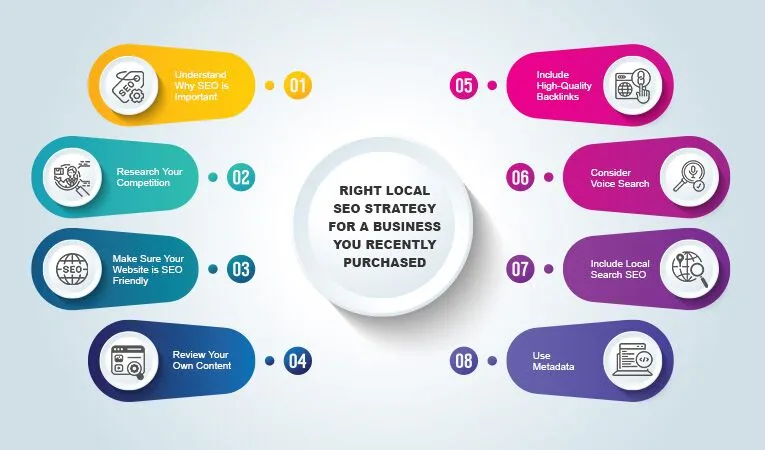Local SEO Uncovered: What It Is And How To Boost Your Rankings
Table of Contents

- jaro education
- 25, September 2024
- 7:00 pm
Local search can work as magic for small businesses as research shows that 76% of people who search for some services nearby on their smartphones visit a business within a day. If your business isn’t set up for local SEO, you risk losing out on valuable customers who are ready to shop nearby. Simply put, local SEO is essential for keeping your business competitive and visible.
To help you improve your local SEO strategy, we’ve developed a detailed guide pack that will give you step by step guidance to get you started. By the time you finish the guide, you’ll know exactly how to optimize your business to attract local customers looking for products or services like yours.
What is Local SEO?
Local SEO, also known as local search engine optimization, is an optimization practice that is designed to boost a website’s visibility in local search results. This specialized area of SEO focuses on optimizing a website to be more search engine-friendly for users searching for services or products in specific geographic areas. Here are some Examples of Local SEO for better understanding:
For Example you are new to the city and area and looking for a coffee shop. Here is how search engines will show coffee shops in search results.

Example 2: You arrived in bangalore for the first time and were looking for a hair salon. Here is how Google Map pack feature will help you to get faster and better results.

Why Does Local SEO Matters?
Every month, Google processes billions of searches with local intent, meaning businesses that rank well for these queries have a better chance of drawing in customers.
Google shows local search results when it determines that users are seeking nearby products, services, or amenities—or when they specify a particular location.
For instance, using SEO tools, you can research local keywords such as:
- “Best Panjabi restaurants”
- Panjabi restaurants near me”
- “Panjabi restaurants in Mumbai”
Businesses that excel in local technical SEO have more chances to appear at the top of search results for these types of keywords, increasing their visibility and engagement with potential customers.
If you look at the statistics, Nearly half 46% of Google searches involve local intent, according to Search Engine Roundtable. RankRanger notes that 29% of Google search results feature a local pack. Additionally, Google reports that 76% of users who conduct local searches on their smartphones end up visiting a store within the same day. These numbers are enough to consider the potential of local SEO for business.
How Does Local SEO Work?

*outreachdigitalmarketing.com
Local SEO works by optimizing your business’s online presence to increase visibility in local search results. When someone searches for a service or product with local intent—think “best coffee shop near me” or “emergency plumber in San Diego”—Google’s algorithm looks for the most relevant and geographically close results. Unlike general SEO, which focuses on ranking across the web, local SEO zeroes in on improving your presence in specific locations. But how exactly does it work? Let’s break it down into several key elements:
1. Google My Business (GMB) Profile
Your Google My Business or GMB profile plays a crucial role in local SEO. When users search for a local business or service, Google prioritizes results from its GMB database, especially in the Local Pack (the top three businesses that appear alongside a map in search results). Here’s how GMB helps your business:
- Verification and Authority: A fully optimized and verified GMB profile signals to Google that your business is legitimate and active. This is crucial for ranking well in local searches.
- Information Accuracy: Google pulls essential data—like your business name, address, phone number (NAP), and hours of operation—directly from your GMB profile. If this information is accurate and up-to-date, your business is more likely to appear in local results.
- Engagement: GMB allows you to engage directly with customers through posts, reviews, and updates. The more actively you engage, the more likely your business or brand will rank higher in local search results.
2. NAP Consistency
Consistency is key when it comes to your Name, Address, and Phone Number (NAP). Google cross-checks your NAP information across various sources like your website, social media profiles, and business directories. If there are inconsistencies (like different phone numbers or slight address variations), it can confuse Google and reduce your chances of ranking well.
- Why It Matters: Google uses NAP data as a trust signal. If your NAP is consistent across the web, it tells Google that your business is reliable and well-established, which boosts your chances of appearing in local search results.
3. Location-Based Keywords
Just like with traditional SEO, keyword optimization plays a big role in local SEO. However, in local SEO, the focus is on location-specific keywords. These keywords should reflect both your business and the area in which you operate. For example, if you run a bakery in Seattle, you’d want to target keywords like “best bakery in Seattle” or “Seattle cupcake delivery.”
- On-Page Optimization: Incorporate local keywords in your website’s title tags, meta descriptions, headers, and body text. Google crawls your website to match these keywords with relevant local searches.
- Content Creation: Creating blog posts or landing pages that focus on local topics can improve your rankings for geographically related searches.
4. Online Reviews and Ratings
Customer reviews are one of the most influential factors for local SEO. Google takes into account the number and quality of reviews your business receives. Positive reviews, particularly those on Google, can help boost your ranking, while a lack of reviews—or negative reviews—can have the opposite effect.
- Why It’s Important: Reviews are essentially user-generated content that tells Google (and potential customers) that your business is trustworthy and popular. Businesses with genuine and positive reviews tend to rank higher in the Local Serp result.
- How to Leverage Reviews: Encourage satisfied customers to add reviews, ratings and respond to both positive and negative feedback. Engaging with customers shows Google that you are an active and responsible business owner.
5. Local Citations
An online citation is any online mention of your brand or business’s NAP on other websites or directories, such as Yelp, TripAdvisor, or local business directories. Google relies on these citations to confirm the accuracy of your business details and enhance its credibility.
- The Role of Citations: Citations help search engines confirm that your business exists and serves a specific location. The more high-quality, consistent citations your business has, the better it will rank in local searches.
- Best Practices: Ensure your business information is correct across all platforms. Tools like Moz Local or BrightLocal can help manage and monitor citations to ensure accuracy.
6. Localized Content
Developing content that serves your local area can impact your ranking on local SEO. This could involve creating blog posts focused on local events, news, or industry trends that appeal to users within your geographic location.
- Why Local Content Matters: Google prioritizes businesses that appear to be “local experts.” Creating content that focuses on topics relevant to your community or region can establish your business as a local expert and boost your visibility in local search results.
- How to Implement: Create service area pages, blog posts, or guides that mention local neighborhoods, cities, or regions that you serve. For example, a real estate agent in Miami might write a post about “Top Neighborhoods to Buy a Home in Miami in 2024.”
7. Backlinks and Local SEO
Backlinks, or links from other websites to yours, are one of the strongest ranking factors in SEO, including local SEO. However, in the context of local SEO, the quality of the links and their local relevance is more important than sheer quantity.
8. Mobile Optimization
Given that 61% of Google searches are now done on mobile, having a mobile-friendly website is a non-negotiable part of local SEO. Most “near me” searches are conducted on mobile devices by users looking for instant results—whether it’s finding a restaurant or a locksmith.
- Why It Matters: Google has shifted to mobile-first indexing, which means it prioritizes mobile-friendly websites in search rankings. If your site isn’t optimized for mobile, you risk losing out on local customers.
- How to Optimize: Test your website responsiveness, loading speed, and is easy to navigate on a smartphone or tablet. Simple things like click-to-call buttons or mobile-friendly forms can make a big difference.
Digital Marketing and Growth Strategy with Jaro Education
Effective marketing drives business growth by connecting brands with their audience and boosting visibility. Strategies like social media, content creation, and Local SEO are crucial for attracting customers and competing in local markets.
To stay competitive, specialized education in digital marketing is key. Jaro Education’s Professional Certificate Programme in Digital Marketing for Performance & Growth with IIM Kozhikode offers essential skills in SEO, analytics, and customer engagement for sustainable growth.
Conclusion
SEO terminology could be a game changer strategy for businesses that rely on nearby customers. Whether you’re a single-location shop or a growing chain, the strategies outlined here will help boost your visibility in local searches, improve foot traffic, and ultimately increase sales. Optimize your Google My Business profile, maintain consistent NAP (Name, Address, Phone Number) details, gather positive online reviews, and produce locally relevant content, and you will be able to take significant steps toward dominating your local market.
Don’t wait to make your mark—start optimizing for local SEO today and watch your business grow within your community.
Frequently Asked Questions
Local SEO focuses on optimizing a business for location-based searches, while traditional SEO aims for broader, non-location-specific search rankings.
Local businesses that rely on customers in specific geographic areas, like restaurants, stores, or service providers, use local SEO.
While optimizing for local SEO can be done for free, some tools and services may come with costs.
Local SEO optimized for local search results, while technical SEO improves the website’s structure and performance for better search engine crawling and indexing.
Yes, local SEO is highly effective for attracting customers from specific geographic areas, especially for businesses targeting local markets.










1 thought on “Local SEO Uncovered: What It Is And How To Boost Your Rankings”
Great insights into local SEO! The emphasis on optimizing Google Business Profiles and gathering customer reviews is spot on. Local SEO is a game-changer for small businesses aiming to attract nearby customers. Adding location-based keywords and building local backlinks can further enhance visibility. Thanks for breaking it down so clearly! For more valuable resources and services similar to our discussion, explore https://bawejamedia.com/